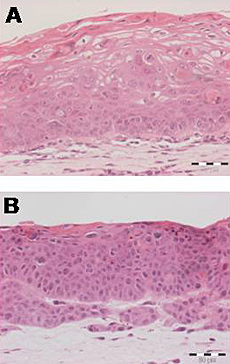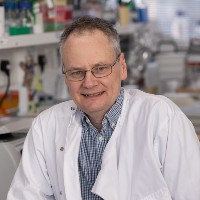Our Research
Our group aims to translate basic scientific advances into improved clinical management of cancer. We work in three main areas:
- Mechanisms of cervical neoplastic progression.
We study early events in the development of cervical carcinoma, in order to: (i) improve identification of the pre-cancers and early cancers that are more likely to progress; (ii) understand the effects and risks of treatments currently in use or development; (iii) identify new therapeutic strategies, targeting high-risk human papillomavirus (HR-HPV) oncogenes or host factors. We use an extensive archive of frozen and fixed cervical tissue, together with the unique W12 system, which represents an accurate and validated in vitro longitudinal model of cervical carcinogenesis. Questions of current interest are:
- Do specific genetic and/or epigenetic abnormalities underlie deregulation of HR-HPV oncogene expression during cervical neoplastic progression?
- Does the contribution of steroid hormones to cervical carcinogenesis depend on HR-HPV physical state and/or integration site?
- Does HR-HPV down-regulate cellular anti-virus receptors to promote persistence?
- Does HR-HPV-induced insertional mutagenesis contribute to clonal selection during neoplastic progression?
- Therapeutic targets in squamous cell carcinoma
Copy number gain of chromosome 5p is one of the most common genomic imbalances in cervical SCC. We discovered the role of two genes on chromosome 5p that are frequently over-expressed in advanced disease. The first is Drosha, a key enzyme in the microRNA biogenesis pathway, while the second is the cell surface cytokine receptor oncostatin M receptor (OSMR), which strongly predicts adverse overall survival in cervical SCC. OSMR is a promising target for antibody-mediated inhibition in SCC, a strategy that has had a major impact on HER2-positive breast cancers. Work in the lab currently focuses on targeting over-expressed OSMR to improve the treatment of advanced SCC. Questions of interest are:
- Is OSMR a prognostic marker and therapeutic target in SCCs of other anatomical sites?
- What are the consequences of OSMR over-expression in SCCs? What is the role of OSMR in constitutive activation of downstream signalling pathways?
- What is the effect of OSMR over-expression on the tumour microenvironment?
- Can therapeutic approaches for inhibiting OSMR signalling inhibit SCC progression, through reduced cell migration, invasion and angiogenesis?
- Malignant germ cell tumours and paediatric cancers
We study genetic changes in solid tumours of childhood, with a particular focus on malignant germ cell tumours (GCTs). Our paediatric GCT project is a national translational study, approved by the UK Children’s Cancer and Leukaemia Group (CCLG) and led by Professor Nick Coleman, Dr Matt Murray and Dr James Nicholson. We undertook detailed genomic and transcriptomic analyses of GCTs and were the first to identify important universal abnormalities in these tumours. In particular, we showed that microRNAs from the miR-371~373 and miR-302/367 clusters are highly over-expressed in all malignant GCTs, regardless of patient age, histological subtype or anatomical site. We are now extending this work as follows:
- Novel blood tests for paediatric cancer
We demonstrated that serum levels of miR-371~373 and miR-302/367 microRNAs are elevated at the time of malignant GCT diagnosis and may be tracked during treatment. We extended this work to show that a wide range of common solid tumours of childhood have specific diagnostic serum microRNA profiles. We are currently developing clinical protocols for serum microRNA testing in childhood cancer diagnosis, prognostication and monitoring. - Mechanisms of malignant GCT progression
We are studying the upstream causes of altered expression of non-coding RNAs in GCTs, together with the downstream consequences for driving malignant GCT progression
- Novel blood tests for paediatric cancer
Professor Nick Coleman
Principal Investigator
|
Dr Cinzia Scarpini Senior Research Associate |
Dawn Ward Senior Research Lab Technician |
Tasmia Mirza PhD Student |





